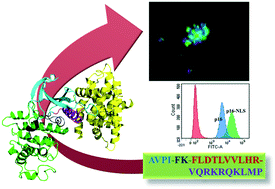Designed hybrid anticancer nuclear-localized peptide inhibits aggressive cancer cell proliferation†
Abstract
Cell proliferation is a crucial step that might promote cancer if deregulated. Therefore, this vital segment is critically controlled by a complicated cell-cycle process in normal cells that is regulated by some regulatory proteins. It has been observed that p16 protein, playing a crucial role in cell-cycle progression/regulation, remains inactivated in different cancer cells. This inactivity of p16 protein leads to the enhancement of cancer cell proliferation by allowing uncontrolled cancer cell division. Hence, the activity of p16 protein needs to be restored using new viral vectors, small molecules as well as peptides to control/suppress this type of abnormal cell proliferation. In this work, we have taken an interesting approach to increase the efficiency and bio-availability of p16 peptide (functional part of p16 protein) to be an aggressive anti-leukemia therapeutic agent by conjugating a nuclear-localized signal (NLS) sequence and a short peptide (AVPI) with it. Moreover, this newly designed NLS attached hybrid peptide greatly affects XIAP expressing but p16 lower expressing human chronic myelogenous leukemia (CML) cell proliferation by targeting both nuclear (CDK4/cyclin D) and cellular factors (XIAP) and promoting the caspase-3 dependent apoptosis pathway.



 Please wait while we load your content...
Please wait while we load your content...